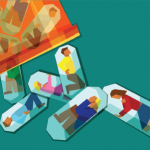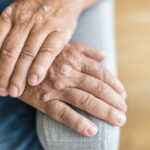Experts discussed the heavy toll the pandemic has taken on patients and clinicians, with many patients in need of mental health support and others in need of rehabilitation.


Experts discussed the heavy toll the pandemic has taken on patients and clinicians, with many patients in need of mental health support and others in need of rehabilitation.

Experts discuss how rheumatologists must consider the psychosocial aspect of care in the decision-making process for women when addressing their reproductive health needs, in addition to medication safety.

How are rheumatology professionals affected by the physical distancing and other challenges presented by COVID-19? The Rheumatologist interviewed Adena Batterman, MSW, LCSW, senior manager of inflammatory arthritis support and education programs at the Hospital for Special Surgery, New York, to discuss how the pandemic has changed the way she and her staff maintain continuity of…

Larry Beresford |
A recent position statement by the Society of Behavioral Medicine (SBM) concludes that patients with persistent pain need better access to psychosocial care in all healthcare settings.1 The SBM offers 10 health policy recommendations for improving such access, including removing system-related barriers, providing referral tools, reimbursing for evidence-based psychosocial approaches, prioritizing generalist-level and specialist pain…
Will Boggs MD |
NEW YORK (Reuters Health)—People with persistent pain need better access to psychosocial care, according to a position statement from the Society of Behavioral Medicine (SBM). “Psychosocial approaches to pain management need to be available for all individuals with persistent pain in all healthcare settings,” Dr. E. Amy Janke from the University of the Sciences, in…

Elizabeth Hofheinz, MPH, MEd |
It’s a bit ironic that when injured people are in pain—and their mobility is reduced—they are often expected to travel to a physical therapy clinic. For millions of people, such trips are a burden. In Australia, however, some patients are “letting movement come to them.” Novel research from The University of Melbourne shows that taking…
Experts offered perspectives on how symptoms of rheumatic disease, such as fatigue, affect the physical, cognitive and emotional health of patients and offered solutions.

David S. Pisetsky, MD, PhD |
Editor’s note: What research on psoriatic arthritis (PsA) presented at ACR Convergence 2024 has the greatest potential for a positive impact on clinical care, treatment options or serve as the basis for future research? That’s the question The Rheumatologist asked David S. Pisetsky, MD, PhD—our founding editor—to consider. With thousands of research abstracts presented at the…

Kamini E. Kuchinad, MD, MPH, Ambereen Mehta, MD, MPH, David Wu, MD, & Jemima Albayda, MD |
Inclusion body myositis (IBM) is a slowly progressing muscle disease of unknown cause that currently has no effective treatment. IBM is the most common inflammatory myopathy in older individuals, with a rising prevalence of 18.2 per 100,000 in adults older than 50.1,2 The disease characteristically affects the quadriceps and finger flexors, and in later stages…

Lucy Masto, BS, Medha Barbhaiya, MD, MPH, Caroline H. Siegel, MD, MS, Lisa R. Sammaritano, MD, & Michael D. Lockshin, MD |
Undifferentiated connective tissue disease (UCTD) is a diagnosis given to patients who do not fulfill current classification criteria for named connective tissue diseases (CTD)—systemic lupus erythematosus (SLE), rheumatoid arthritis (RA), systemic sclerosis (SSc), or Sjögren’s disease—but who nonetheless have clinical signs and symptoms and serological evidence of autoimmune CTDs. In 1980 LeRoy et al. were…